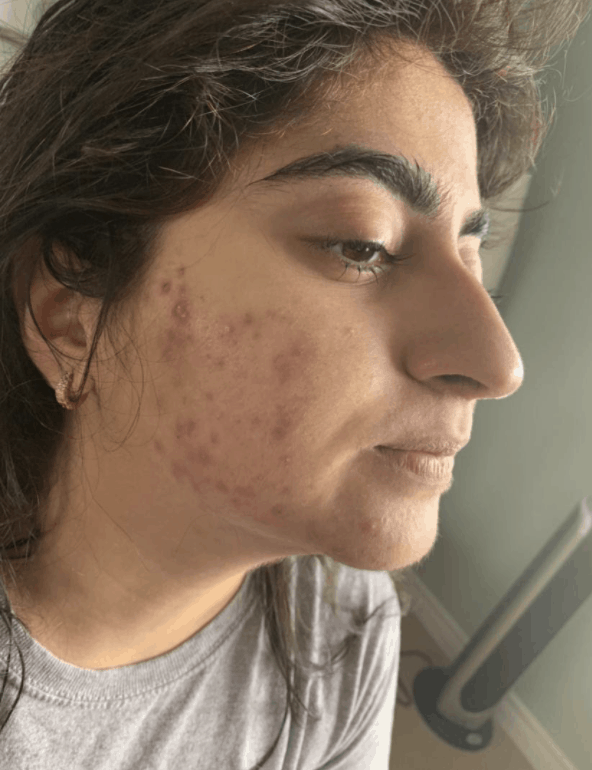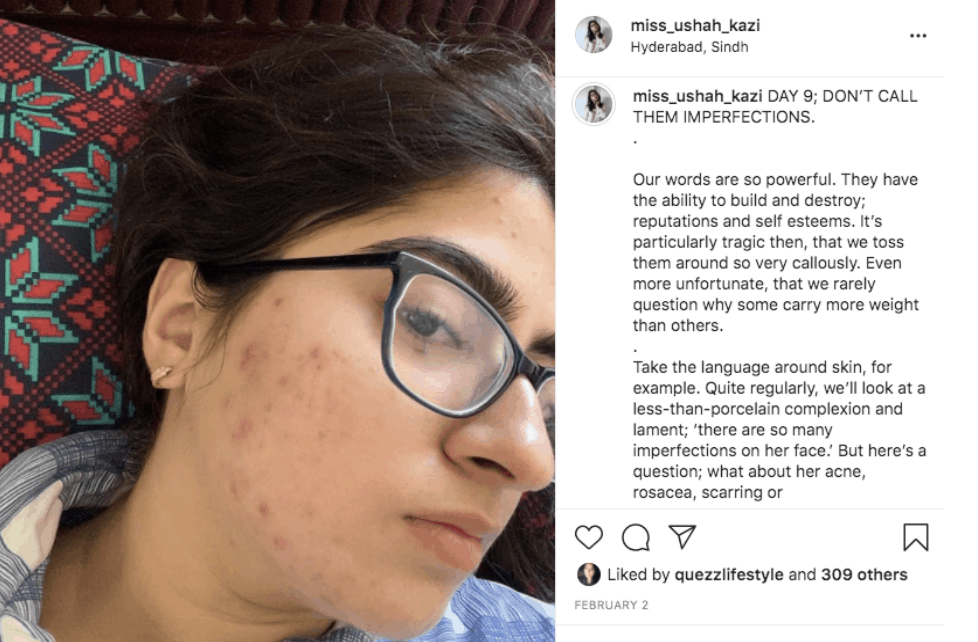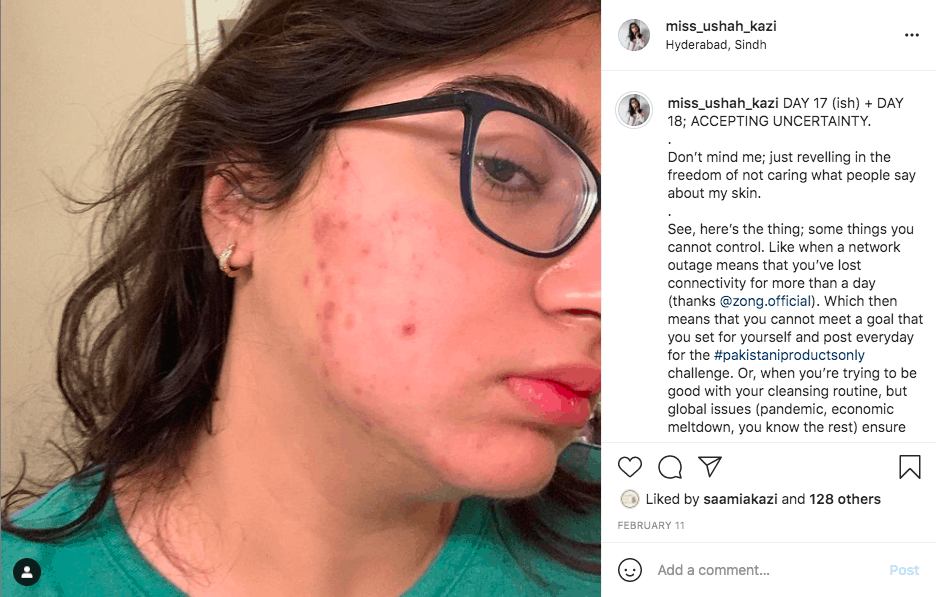Acne is the most common skin condition, affecting 40 to 50 million individuals annually; yet there is social stigma around it. One of our Mashion followers, Ushah Kazi, had to personally deal with this negativity when she decided to post a barefaced selfie on social media. This unedited photo showcased her in all her natural beauty, and was her way of accepting and owning her acne, something that was very much a part of her. But the internet trolls, like always, felt the need to assert their opinion about it. In the article below, Ushah speaks about how Pakistan desperately needs acne positivity; it is only through positive re-enforcement that society will eventually start to see acne as the very normal thing it is.

Acne Positivity
Rumoured to have started when blogger Kali Kushner bared her face to the internet, the Acne Positivity movement has always fascinated me. As someone who has had regular bouts of acne ever since I was a child, I’d grown used to the taunts and the turning heads. By the time I was a teenager, I had discovered makeup, and with it the means to feign ‘perfect’ skin. Like all Pakistanis, I had grown up with the transformative cosmetic cream ads in which magical waves of photoshop would wash over the regular girl with real skin. These narratives were carved into my self-esteem; that if I warped myself into what was socially desirable, society would in turn reward me. And for the most part, I found their wisdom (if we can call it that) to be sound. A clear skinned selfie got me likes, validation and encouragement. In contrast, whenever I showed off my real skin, in all its imperfect glory, I’d experience a kaleidoscope of disapproval. The typical ‘how do you live with yourself’ dirge was unpleasant, but not unexpected. But the gaslighting efforts to belittle, in the guise of helpful advice, were the most damaging; their authors would genuinely try to convince me (and themselves, I’m sure) that they were trying to help.
This cycle convinced me to cover any signs of my skin, as it tried to breathe underneath the layers of foundation. And every time, it also reminded me that there was only room for one kind of me. That, the regular girl with the real skin would have to concede her place to her always made-up twin. My acne, scarring, blackheads and enlarged pores weren’t just signs of a skin condition. They were incurable faults – always to be hidden if they couldn’t be fixed.
All Of Me
That is how my skin story had been, until a pandemic put things into perspective. In a YouTube video, cosmetic formulator and skin of colour expert Dr. Vanita Rattan, summed up 2020 by saying, “I feel like we all were just walking around with acne marks…”
Now, you don’t have to acknowledge that that hit home; but that hit home. Acne is a really complicated condition. I would like to tell you that it is a passing teenage phase, except it has yet to pass me by. Instead, acne can be triggered by a range of factors: your hormones, stress levels, diet, and genetics (thanks dad) can all trigger or worsen it.
Around this time last year, as the global numbers reached a terrifying peak, I had my worst bout in years. It was a culmination of the stress that all of us were experiencing, and just how bad my diet had gotten. By mid-March, my face was covered with pimples and pigmentation. And I decided to do something I had never done before; I decided to document.
I took weekly pictures of my skin, as a diary of sorts. In part, I had started making some very deliberate lifestyle changes, and I wanted to chart my journey. But, I think part of the reason behind these photos is that I wanted to see my skin for what it was.

March 2020
A Different Story
Eventually my skin cleared up, much like it has in the past. By this time, I was back in Pakistan, and was enamoured by how the conversation around skincare was so very different, and yet completely the same. On the one hand, I saw celebrities posting barefaced pictures, and there was a new crop of brands putting the ‘care’ back into skincare.
And yet, as I created content that encouraged people to support local brands, I also noticed that acne was still treated like an anomaly. Or even more dangerously, as a personal failure; that it somehow indicated the state of someone’s hygiene, health and self-confidence (it doesn’t by the way). So, I decided to take a rather impulsive plunge, and posted one of those fateful barefaced selfies online.

The first time I showed my acne online
The response was surprisingly positive. In particular I was glad to see that it wasn’t just people who could most relate to me who were appreciative. There were the odd naysayers, of course. But I took their negativity as a reminder that the world hadn’t changed all that much. For the most part, I was happy that people felt a tiny bit more confident about their skin, because I had opted to show mine.
I was so happy, in fact, that I decided to post another one of my photos.

My second barefaced post
This time, the vitriol wasn’t skin deep. It was much more personal; in particular, it was the sort of stuff that likens a skin condition to divine providence. Now, you can roll your eyes (I did) but we’ve all heard nonsense like this. What made it worse, was that at the same time, I had someone in my DMs asking me how I’d cleared my acne. In particular, she was concerned that her newly textured skin (she’d developed acne after giving birth) would affect her relationship with her new spouse. But yet again, we have all heard about, or even experienced, nonsense like this.

Pakistan Needs Acne Positivity
Recently, many global movements have inspired conversations in Pakistan. To be fair, I don’t think that aping international trends automatically translates into something valuable. But there is an opportunity with the Acne Positivity movement to encourage Pakistanis to embrace themselves.
Firstly, the tradition of unattainable beauty standards has done exactly what it was supposed to do. It was supposed to make us want, be and have things that were always out of reach. But as we move towards uncertainty, we cannot be so very alienated from ourselves. The kind of messages I have gotten in the wake of my post, are heartbreaking. In large part because most of them end with the same question; ‘does it get better?’ You wouldn’t think that something that is literally limited to the surface of your skin would cut so deep, but it does. Because, by not showcasing and hiding textured, uneven and real skin, we have given beauty standards this kind of power.
However, attempts to normalise acne are not in vain. Whenever mainstream platforms have broken the mould, there has been enough positivity to neutralise the negativity. Countless people have felt seen and heard, in response to something as effortless as Waqar Hussain using a model with textured skin for a bridal look.
Across pockets of the internet, these conversations are already taking place. People are already showing off their unfiltered skin, and making others comfortable enough to do the same. A more knowledge-focused global skincare scene is already encouraging all of us to abandon beauty standards in favour of skin health and personal happiness. Really, we don’t even need a push anymore; a tiny nudge will do. We just have to take a minute to re-examine all that we’ve been taught to desire. And, in so doing, we just have to stop stifling people long enough for them to let their skin breathe.








What do you think?
You must be logged in to post a comment.